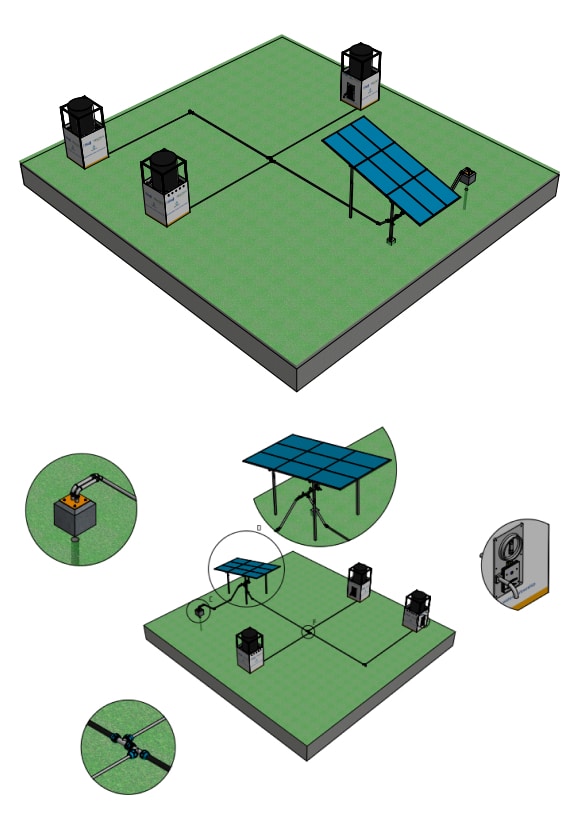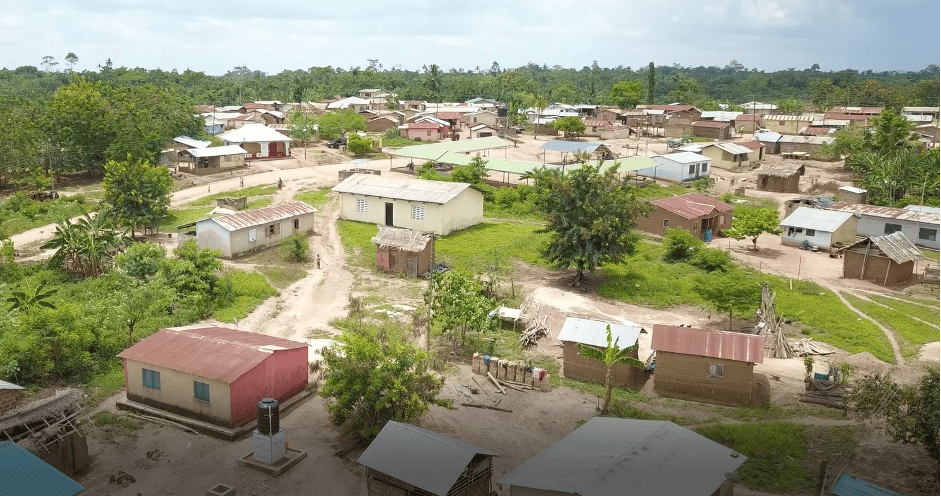Modular Solar-powered WaterTime systems
The model to garantuee water at rural people's doorstep sustainably
A business case to deliver safe and reliable water services at people’s doorstep in urban areas is proven to be possible, but how to realise this for rural areas in the global South? Governments and rural communities like to make the transition from handpumps to piped mini-grid systems, but struggle to overcome the numerous challenges they face, like low service levels with long downtimes and far walking distances, small and spread-out user groups, low revenue collection and a lack of systematic approaches for operation and maintenance.
The WaterTime concept provides a solution to these challenges by combining a modular solar-powered mini-grid system with water pre-payment and sound water systems asset management practices.
Our innovation
The application of hand pumps is the standard in rural areas of the global South. This fits certain locations but has major drawbacks in other settings. When small settlements are scattered and women and children need to walk long distances to fetch water, one probably aims to provide a safe water resource in each settlement. In this case, constructing hand pumps is a relatively expensive endeavor, especially if deep wells need to be drilled. The limited number of users /paying consumers per well also reduces the chance of a sustainable business case for operation and maintenance in the long run. Furthermore, rural communities tend to be not willing to pay for handpumps, but do want to pay for water services at their doorstep.
Therefore, Practica developed the modular solar-powered WaterTime concept, an approach that supports implementing organisations to make the transition from handpumps to solar-powered mini-grids while building a sustainable business case for rural water provision.
This starts with a proper planning and design process. Not matching community needs with the service provided – for example, over-dimensioning a water system due to wrongly estimated water demands and future population growth- and inadequate site selection can be causes of failure in the operational phase.
“To introduce a water provision service in a sustainable manner it is key to understand consumer behaviour first and find the optimal service level. The hardware comes secondary.”
Our design
Principle
Practica offers a new approach based on the principles of modularity and low maintenance. This system entails the design of a mini-grid based on the local needs and wants. The core consists of small stand-alone water kiosks. Multiple kiosks can be placed in one village (or set of neighbouring villages) – depending on local circumstances and preferences. These kiosks are fed from a single well without the need for a central water tower. This type of mini-grid setup can be stand alone but also be attached to existing piped networks of water utilities to serve peri-urban settlements.
Configuration
Paying careful attention to site selection and considering the actual water use, the modular piped water system can be placed at a minimal cost (with a minimum of 250 water users). When more water is required, or more people need to be served, additional pipelines, public standpoints, and also household connections can be established— using the same water source.
Additions for success
Easy-to-maintain prepayment devices might be added to ensure cost recovery and support sustainable financial management. This enables the collection of water fees over the years to cover the cost of operation and maintenance. Modular piped water systems provide a higher service level compared to hand pumps since safe water can be tapped near people’s doorstep. The likelihood local communities are willing to pay for water therefore increases too. In this way, these mini-grids allow for operation by local service providers.
Water System Asset Management tools can further support sound financial and technical management of WaterTime systems or any other water infrastructure of your organisation. The toolbox that Practica has developed supports in financial optimisation of water services over time and provides capacity building tools for various target groups. Practica is also well-versed with other developments and applications in the sector, like mWater, and in the position to provide independent consultancy and training on how to sustainably plan, design and monitor your water assets.


Our services
So far, all introduced systems by Practica have been installed with solar panels, which contribute to climate (CO2) neutral operation and lower operational costs. With the expansion of the modular grid, easily extra solar panels can be installed.
Practica provides consultancy services and trains rural water service providers to design water systems with this financially sound and modular approach in mind. Where necessary, we also strengthen and equip the private sector with the technical skills to install, maintain and repair this type of water service. Interested in our training materials, click here.
Learn more about Modular solar-powered mini-grid systems in this webinar
Interested by the modular piped system?
Download the training manual on small modular and solar drinking water systems.
And for more information on our impact, read our page on drinking water supply.
